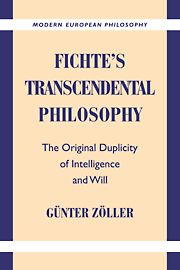Book contents
- Frontmatter
- Contents
- Acknowledgments
- Method of Citation for Fichte's and Kant's Works
- Key to Fichte's Works Cited
- Introduction
- Part I Thinking about Thinking
- Part II Knowing and Doing
- Part III Thinking and Willing
- Part IV Pure Willing
- 7 Determination to Self-determination
- 8 The Unity of Intelligence and Will
- Notes
- Bibliography
- Index
7 - Determination to Self-determination
Published online by Cambridge University Press: 05 June 2012
- Frontmatter
- Contents
- Acknowledgments
- Method of Citation for Fichte's and Kant's Works
- Key to Fichte's Works Cited
- Introduction
- Part I Thinking about Thinking
- Part II Knowing and Doing
- Part III Thinking and Willing
- Part IV Pure Willing
- 7 Determination to Self-determination
- 8 The Unity of Intelligence and Will
- Notes
- Bibliography
- Index
Summary
Among the most consequential innovations in the post-Kantian philosophical discussion is the inclusion of practical philosophy into transcendental philosophy. In Kant the transcendental theory of consciousness and its objects is still restricted to the sphere of theoretical knowledge. Practical knowledge as well as the acting based on such knowledge is dealt with outside of transcendental philosophy, in moral philosophy. Moreover, the concept of the practical in Kant is limited to the morally practical. In Kant a general theory of the practical – of acting and of the knowledge that guides it – is only to be found implicite and in fragments. For Kant, transcendental philosophy, which he understands as critically revised prima philosophia, serves as the conceptual preparation of the “second philosophy.” The concept of freedom, which remains merely problematic in transcendental philosophy, receives its moral-practical realization in a critically grounded metaphysics of morals.
Kant's systematic separation of transcendental philosophy and moral philosophy goes together with the unmediated juxtaposition of the theoretical and the practical use of reason in the human subject. To be sure, Kant insists on the unity of theoretical and practical reason, but this assurance has the status of an idea that is not actually realized in his system.
The post-Kantian transcendentalization of practical philosophy takes its departure from Reinhold's attempt of a renewed, unified foundation of Kant's main doctrines.3 Soon Fichte surpasses Reinhold in this enterprise, in terms of both radicality and originality.
- Type
- Chapter
- Information
- Fichte's Transcendental PhilosophyThe Original Duplicity of Intelligence and Will, pp. 97 - 109Publisher: Cambridge University PressPrint publication year: 1998



